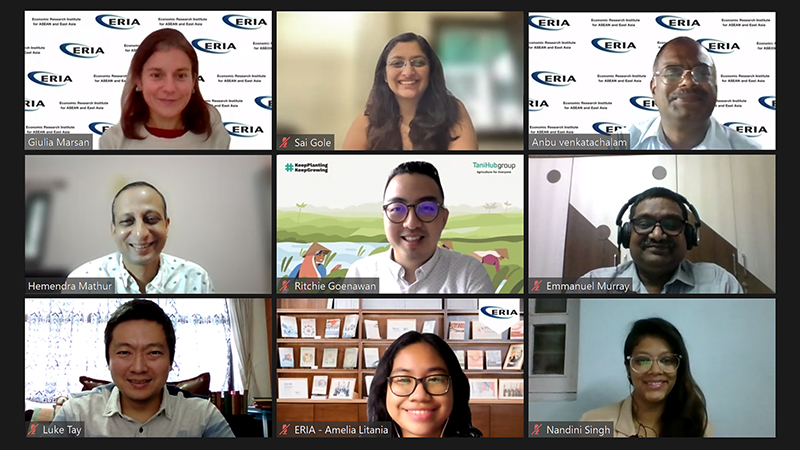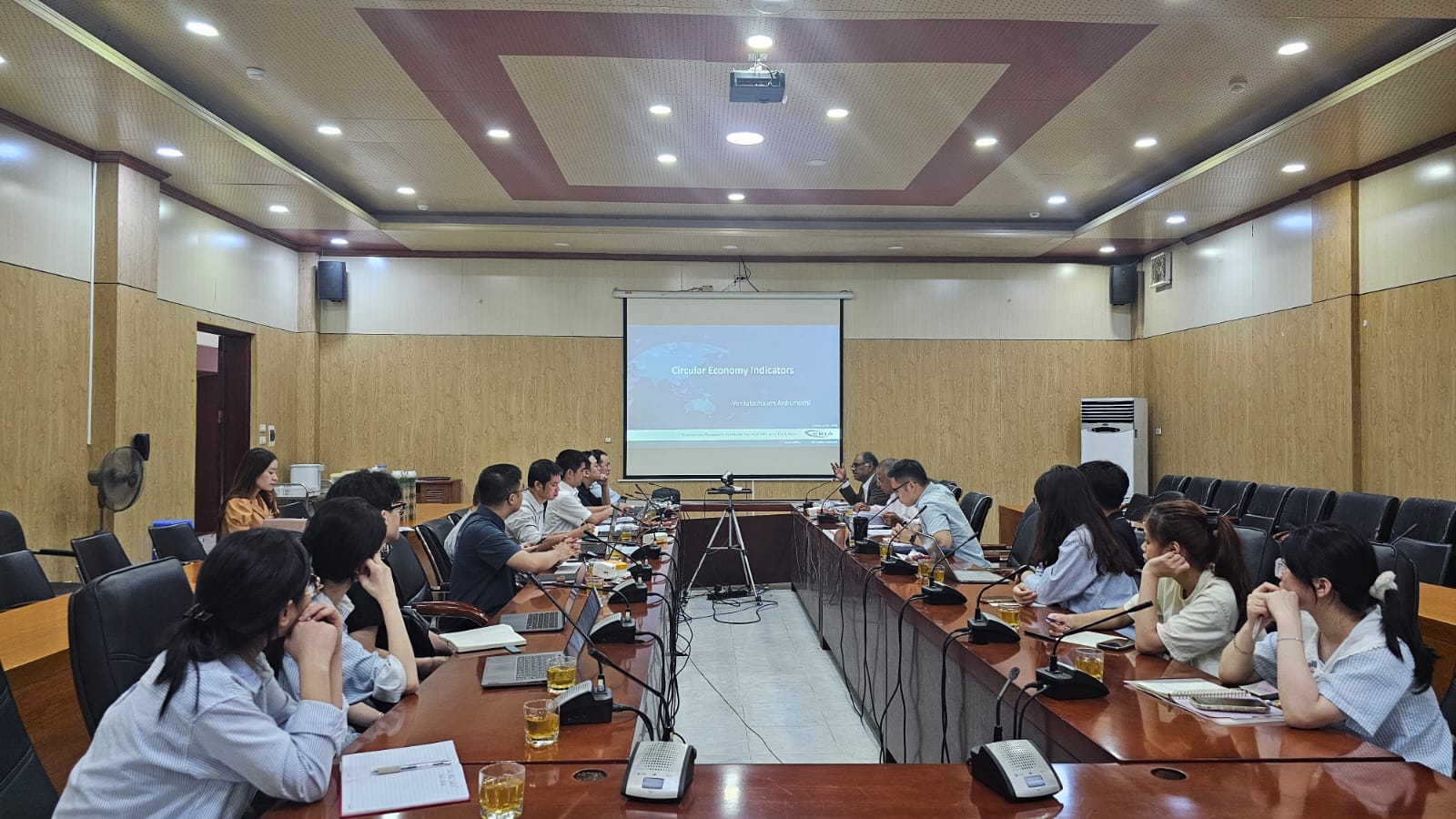Harvesting Insights on Agriculture Technology and Innovation Across ASEAN and India
Date:
11 November 2021Category:
NewsShare Article:
Print Article:
Jakarta/Ahmedabad, 11 November 2021: Agriculture plays a crucial role in the growth of some of the largest economies across the globe – including India and ASEAN. With a continuously growing population and rising demand for agricultural output, there is a growing need for agriculture technology ('agtech') and innovatiive solutions to increase productivity in the agricultural sector. The pandemic has further acted as a catalyst in pushing the agtech sector to innovate and come up with quick solutions to ride through the uncertainties caused by the disruption in agriculture and food supply chains. The need to enhance agriculture digitalisation is also becoming critical as countries aim to achieve a sustainable economy in the post-pandemic recovery. Along with the governments, entrepreneurs and the private sector are increasingly paying close attention to agtech innovative business models to offer market-based solutions to areas such as digital market and financial access for smallholder farmers, production and supply chains services, and agri-food technology and innovation.
Whilst there are many emerging digital innovations and opportunities to boost the region’s agtech ecosystem, there are also major gaps and challenges that need to be addressed both by India and ASEAN. Among those are uneven technology adoption, fragmented production and supply chains, as well as different levels of economic and regulatory systems that call for a more integrated solution and policy framework.
Five speakers from ASEAN and India, together with Mr Hemendra Mathur, Venture Partner of Bharat Innovation Fund and moderator of the event, shared their knowledge and perspective on innovation and digitalisation in Agteh:
- Dr Venkatachalam Anbumozhi, Director of Research Strategy and Innovation, Economic Research Institute for ASEAN and East Asia (ERIA)
- Mr Ritchie Goenawan, Chief Marketing Officer and Director of People & Culture, TaniHub Group, Indonesia
- Mr Luke Tay, Independent Food Futurist, Singapore
- Ms Sai Gole, Co-founder, BharatAgri, India
- Mr Emmanuel Murray, Senior Advisor, Caspian Impact Investment, India
Mr Hemendra Mathur, Venture Partner of Bharat Innovation Fund, opened the event and discussed trends and dynamics of agtech across India and Asia. He highlighted how innovation in business models can benefit farmers in villages across India and beyond. He also discussed the importance of skills development for technological adoption across different groups of society, including women farmers and entrepreneurs. Amongst agtech ecosystem players, he mentioned the role of agtech start-ups as the key players for enabling smallholder farmers to access the market through digitalisation. He further emphasized the importance of cross-border collaborations and peer learning from entrepreneurs and farmers in different countries in Asia.
Dr Venkatachalam Anbumozhi, Director of Research Strategy and Innovation, ERIA, shared his insight on leading ERIA’s research for the ASEAN Framework on Circular Economy and the role of agriculture technology to support the sustainable economy of ASEAN. He mentioned that the advancement of agriculture technologies would bring a significant contribution to urban resilience and rural areas’ productivity. He further highlighted the importance of public-private partnership and region-wide coordination to address agtech problems such as resource inefficiency, lack of data integration and uneven innovation distribution. Particularly, the use of digital technology will be crucial for the future development of ASEAN smart cities, as it will bring a high-level service efficiency at a lower cost.
Ms Sai Gole, Co-founder, BharatAgri, India shared her experience on scaling up the impact of her start-up, BharatAgri, which focuses on introducing and enabling agriculture digitalisation to farmers across India. She highlighted how BharatAgri helps farmers to access diverse information in crop management such as sowing and harvesting to market information. As the level of education and access to agriculture infrastructure varies among farmers, it is important for BharatAgri to provide personalised material that helps farmers digest information easier and make a well-informed decision. She further highlighted the importance of customers’ understanding of the value of agtech products and how this would make technology adaptation easier and faster for farmers and other agtech stakeholders.
Mr Luke Tay, Independent Food Futurist, Singapore offered his insight on how technology and digitalisation can help address food security issues. He highlighted key challenges to be faced such as the food price inflation and food supply-chain disruption caused by Covid-19, as well as the increasing undernourishment problem across Southeast Asia.He further explained how the government and private sector’s role in investing and financing agtech businesses would help the food system to be more resilient in the Covid-19 recovery process. He further shared his views on the future of the food system that will be highly influenced by several uncertainties such as climate change, population, and geopolitics situation that might affect food technology and supply chain.
Mr Emmanuel Murray Senior Advisor, Caspian Impact Investment, India shared his experience in supporting many early stage agtech start-ups and businesses and discussed the role of ecosystem partners to support agtech innovation and digitalisation in the region. He highlighted the importance of bringing research institutions and agriculture experts or scientists to help businesses and start-ups leverage their agriculture products to the consumers. He further emphasized the need for policymakers to support agtech businesses to deliver their impact at a large scale, subsidising the cost of innovation and promoting the adoption of agtech technologies.
Mr Ritchie Goenawan, Chief Marketing Officer and Director of People & Culture, TaniHub Group, Indonesia shared his insights on managing and strategizing the growth of TaniHub as one of the biggest and leading agtech & e-groceries start-up in Southeast Asia. He highlighted the large agriculture market size in Indonesia that still has many untapped potentials and mentioned that one of the root problems of Indonesia’s agriculture is the inefficiency due to imbalance demand-supply across commodities and regions. To tackle this problem, TaniHub plays a critical role by simultaneously serving the upstream (B2B customers) and downstream (B2C customers) markets. He further highlighted the importance of constant adaptation to customers’ needs and partnering with the right institutions to improve services.
During the Q&A session, Mr Mathur highlighted how to share agtech innovation and digitalisation across borders. The speakers further discussed collaboration and partnership as a key to leveraging the dissemination of agtech digitalisation between ecosystem players across Southeast Asia and India.
The webinar was jointly organised by CIIE.CO, a leading innovation centre and incubator at the Indian Institute of Management in Ahmedabad, and ERIA, under the Strategy and Partnership Programme, funded by Australia.








